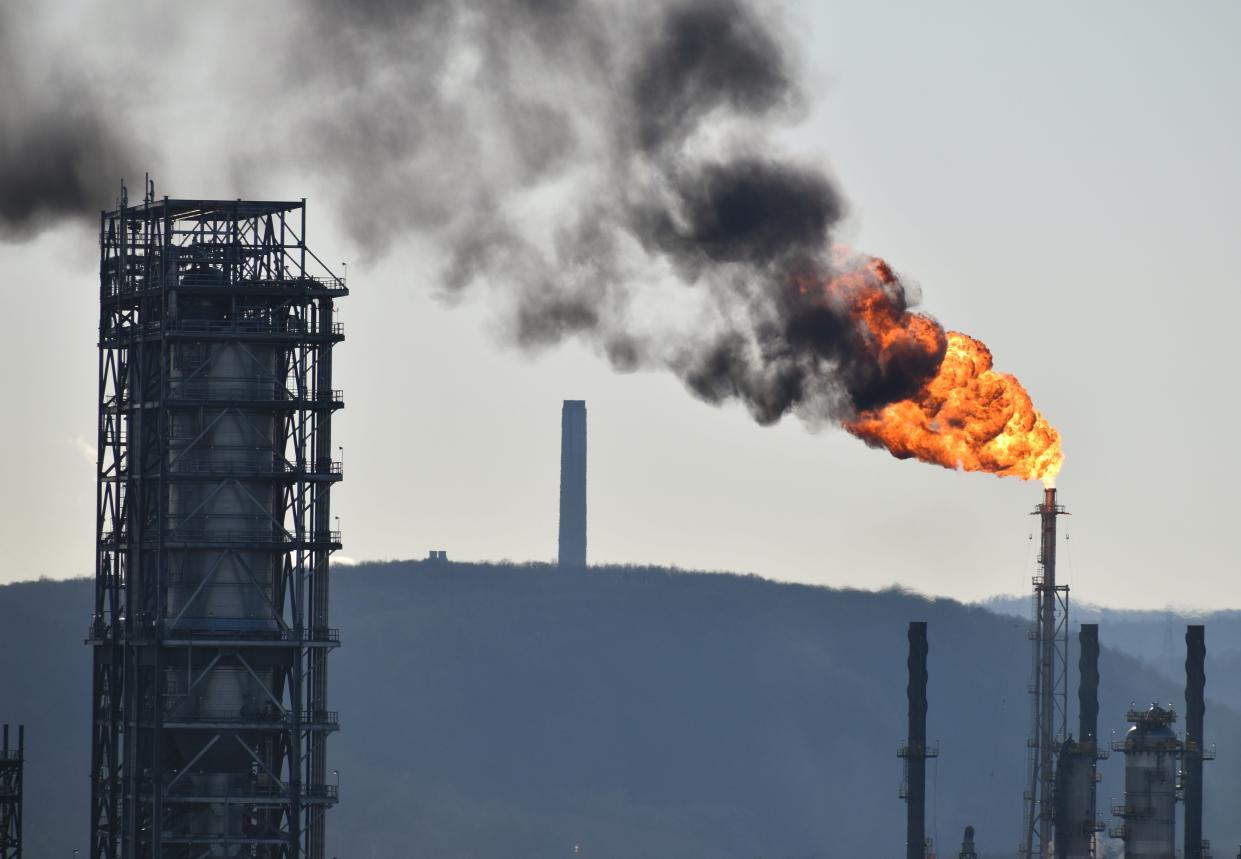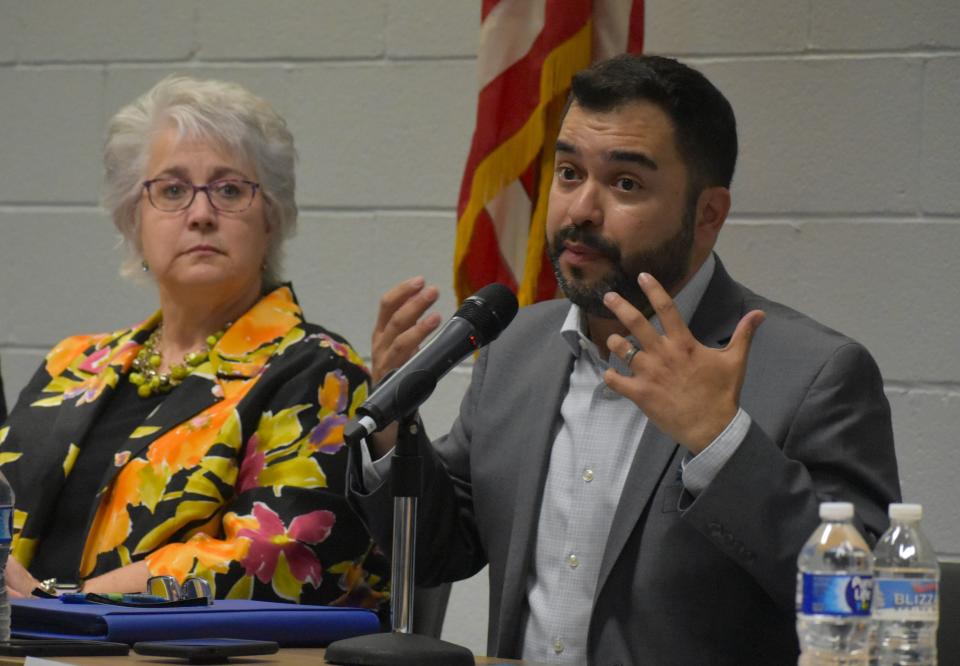Panel sets criteria for $5 million Shell mitigation fund in Beaver County

An advisory group finalized eligibility requirements for Beaver County’s $5 million environmental mitigation fund Friday — established earlier this year in a Shell air violation settlement.
Shell in May signed a consent order and agreement with Pennsylvania’s Department of Environmental Protection to resolve months of pollution exceedances, paying nearly $10 million for repeated air permit violations at the company’s Potter Township ethane cracker plant.
The company paid a $4.9 million civil penalty to the DEP and another $5 million to establish a fund for projects that benefit the “environment, health and quality of life” of those living near the petrochemical plant. The DEP Office of Environmental Justice is assisting the effort, forming a 17-person steering committee comprised primarily of representatives from Beaver County organizations to develop protocol for seeking, evaluating and supporting projects through the fund.
More: Shell to pay $10 million for air violations and restart cracker plant production
The criteria calls for at least one selected project to provide regular independent air quality testing within the facility’s vicinity, and at least one other project focused on “meaningful community education and engagement that fosters civic participation” in developing strategies focused on improving residents’ health and quality of life.
Only designated 501(c)(3)’s based in Beaver County, or those partnering with a qualifying Beaver County tax-exempt organization on projects based in Beaver County benefiting environment, health and quality of life, will be eligible for funding.
“That language was intentionally vague, ceding the authority and responsibility for allocating such funds to representatives from the community,” Fernando Treviño, special deputy secretary of DEP’s recently expanded Office of Environmental Justice, told the Times.
Projects that lobby, engage in advocacy against public, private or government organizations, support litigation, or promote hate, discrimination or violence are ineligible for funding.
Now, the panel will craft an implementation plan for project submittal, evaluation and selection, establish the financial entity to serve as the fund’s trustee and outline a disbursement process for approved projects. A separate, yet-to-be-formed community advisory board will then be selected to receive, evaluate and approve projects.

The final implementation plan is expected to be released within a few weeks. After that, six to eight weeks will be spent “hosting public events to inform applicants on the process and qualifications,” Treviño said, and the second advisory panel will accept applications and hear proposals for up to two months.
“Then, there will be four to five weeks to review and have meetings on what projects have been presented,” said Treviño. “I think we can have final recommendations by mid-December for at least first-round funding and, hopefully, issue the first round of funding before the end of the year.”
At a July 13 steering committee listening session, residents cited the need for independent air monitoring and improved noise pollution mitigation near the ethane cracker facility. Donna Treemarchi, whose family lives behind the complex, said Shell’s onsite railroad causes routine sleep disruptions.
“I had to move out of my master bedroom this week because I don't sleep,” she said. “It’s all night, trains every two minutes. It’s really bad, and it’s ruining my life.”
More: Activists ask Beaver County leaders to support greater oversight of Shell cracker plant
Nonprofit leaders who spoke during the meeting urged panelists to resist setting hard funding caps and to allow for multi-year commitments.
“A place like Beaver County has a lot of relatively early stage or low-capacity organizations,” said steering committee member Daniel Rossi-Keen, executive director of RiverWise. “To be told they have to absorb $500,000 worth of a grant in their fiscal year would be prohibitively overwhelming ... I’m continually pushing for as inclusive a process as possible that allows the kind of organizations that inhabit a place like Beaver County to be able to make the strongest case possible for the level of funding that’s most appropriate for their organizational lifecycle.”
Treviño, who joined the DEP’s environmental justice office as special deputy secretary four months ago, said securing this $5 million funding pool — and directly involving community leaders in its allocation — reflects a shift in the state's environmental justice priorities. Staffing has nearly tripled in DEP's environmental justice office, he said, to about a dozen people. The Beaver County mitigation fund initiative, he said, is fairly unprecedented for the DEP and will likely serve as a pilot for similar approaches throughout Pennsylvania.
More: Community panel to make plan for Shell’s $5 million air quality settlement fund
“The hope is that we do something good, and, if we’re able to bring the community back to trust us a little bit … that we can replicate this not only in case there are future violations by Shell, but statewide with any company,” he said. “We really want this to become the new norm for DEP.”
Treviño assembled the steering committee within weeks, he said, because the settlement agreement allotted 60 days to develop a protocol. He met with community stakeholders and prominent residents, asking each for panel recommendations. Shell representatives and his office both submitted recommendations, he said, as parties in the consent order.
“I received about 35 names from different leaders and community members,” he said. “Out of that, I reviewed the list and, considering a diversity of representation in industry, expertise, community reputation and demographics, I chose a list of finalists.”
The list was reviewed by an internal working group within DEP, he said. Residents questioned Shell’s involvement in the recommendation process at the July 13 meeting. Others urged DEP to halt operations if the facility remains noncompliant.
“Why does Shell get so much influence?” asked Sister Kari Pohl with Sisters of St. Joseph of Baden. “This is the result of polluting our community.”
“I can guarantee you, and the steering committee knows, that the members of the steering committee suggested by the community outweigh, by a lot, the members recommended by Shell or DEP,” Treviño responded, stressing that no Shell employees sit on the panel. “(Shell) did help appoint a couple of members to the committee, because it’s a collaboration. But the members that were suggested by the public outweigh, by a lot, those members.”
A recording of the July 13 meeting can be found on RiverWise’s Facebook page.
This article originally appeared on Beaver County Times: Panel sets criteria for $5 million environmental mitigation fund

